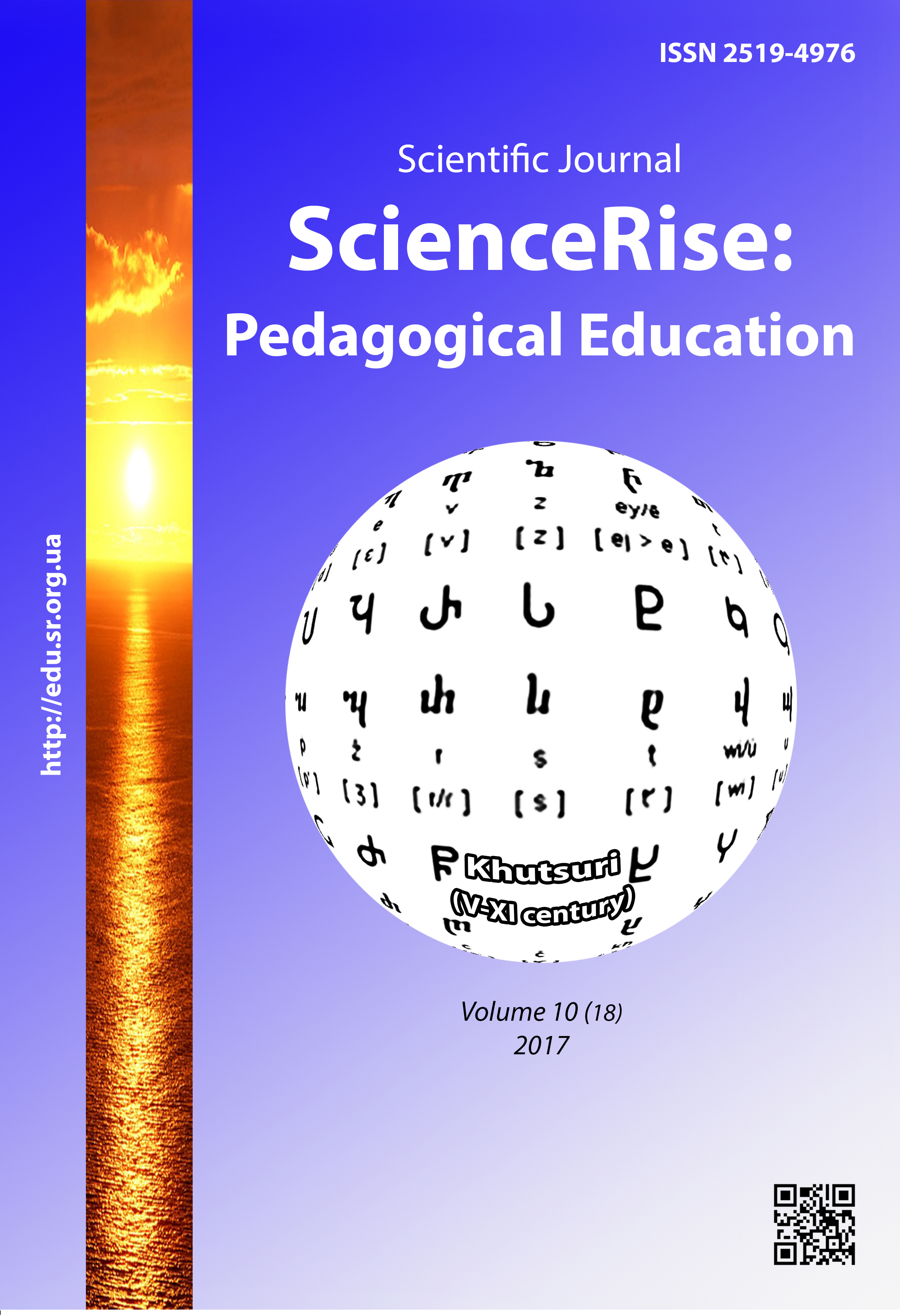Psychological and pedagogical basic of development of readiness pedagogical staff to professional certification
DOI:
https://doi.org/10.15587/2519-4984.2017.113466Keywords:
professional self-development, certification, teachers’ professional competence, readiness to the professional certificationAbstract
Today the demand for certification of pedagogical staff is the priority issue. It is related to rebranding teaching and educators’ competitiveness. The research purpose was to investigate psychological and pedagogical features of forming readiness of educators to certification.
The results of the accomplished questionnaire of respondents of Zaporizhzhia region in 2016-2017 about their attitude toward certification show that 85 % of respondents refer critically. It speaks to the absence of readiness of respondents to educational reform, changes in the system of postgraduate pedagogical education in general and implementation of procedure of certification in particular.
According to the investigation, 62 % of respondents are engaged systematically in self-education. The third of respondents (31 %) pay attention to self-education with the frequency of several times a year. Among basic barriers of professional self-education, respondents name external factors (lack of time (56 %), large academic load (38 %)), and personal factors (emotional fatigue (33 %), lack of motivation to self-education (34 %)). Basic motivators of the professional development are the personal interest in professional activity (60 %) and internal satisfied of the necessity of professional development (48 %). Financial stimulation is the main reason of professional development for 45 % respondents.
Forming of readiness of pedagogical staff to the certification requires learning not only the standard professional knowledge and skills but also the development of professionally meaningful qualities. It is possible due to the implementation of the technology of psychological and pedagogical support of the professional development of pedagogical staff into the process of continuous formation
References
- Zakon Ukrainy “Pro osvitu” vid 05.09.2017 № 2145-VIII [Law of Ukraine “About education” from 05.09.2017 № 2145-VIII]. Available at: http://zakon5.rada.gov.ua/laws/show/2145-19
- Dzyamko, S. S. (2003) Atestatsiya pedahohichnykh kadriv yak mekhanizm upravlinnya yakistyu osvity [Attestation of pedagogical staff as mechanism of management of education quality]. Upravlinnya shkoloyu – School management, 10, 27–31.
- Rubinshteyn, S. L. (1998). Osnovy obshchey psikholohii [Bases of general psychology]. St. Petersburg: Piter Kom, 688.
- Dyachenko, M. I., Kandybovich, L. A. (1976). Psikholohicheskie problem hotovnosti k deystvitel’nosti [Psychological problems of readiness to reality]. Minsk: Belorusskiy hosudarstvennyi universitet im. V. I. Lenina, 176.
- Anan’ev, B. G. (1977). O problemakh sovremennogo chelovekoznaniya [About problems of anthropology]. Moscow: Nauka, 380.
- Platonov, K. K. (1972). O sisteme psikholohii [About the system of psychology]. Moscow: Mysl, 216.
- Kornilova, T. V. (2002). Eksperimental’naya psikholohiya: teoriya i metody [Experimental psychology: theory and methods]. Moscow: Aspect Press, 208.
- Borisova, E. M., Hurevich, K. M. (1997). Psikholohicheskaya diahnostika [Psychological diagnostic]. Moscow: URAO, 210.
- Slovar practicheskoho psikholoha [Dictionary of practical psychologist] (2001). Minsk: Kharvest, 800.
- Hura, O. I. (2006). Psikholoho-pedahohichna kompetentnist’ vykladacha vyshchoho navchal’noho zakladu: teoretyko-metodolohichnyi aspect [Psychological and pedagogical teacher’s competence of higher educational establishment: theoretical and methodological aspect]. Zaporizhzhia: HI “ZIDMU”, 332.
- Branskiy, V. P., Pozharskiy, S. D. (2002). Sotsyal’naya sinerhetica i akmeolohiya [Social synergetic and acmeology]. St. Petersburg: Politekhnika, 476.
Downloads
Published
How to Cite
Issue
Section
License
Copyright (c) 2017 Tetyana Afanas'eva, Yuliya Chemodurova, Olga Bayer, Olga Beregova

This work is licensed under a Creative Commons Attribution 4.0 International License.
Our journal abides by the Creative Commons CC BY copyright rights and permissions for open access journals.
Authors, who are published in this journal, agree to the following conditions:
1. The authors reserve the right to authorship of the work and pass the first publication right of this work to the journal under the terms of a Creative Commons CC BY, which allows others to freely distribute the published research with the obligatory reference to the authors of the original work and the first publication of the work in this journal.
2. The authors have the right to conclude separate supplement agreements that relate to non-exclusive work distribution in the form in which it has been published by the journal (for example, to upload the work to the online storage of the journal or publish it as part of a monograph), provided that the reference to the first publication of the work in this journal is included.








